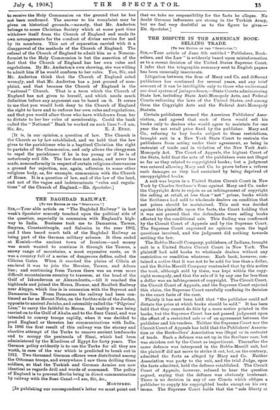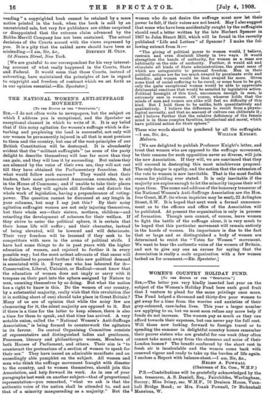THE DISPUTE IN THE AMERICAN BOOK.
SELLING TRADE.
[To THE EDITOR Or THE "SPECTATOR.") SIR,—Your article of June 6th entitled "Publishers, Book- sellers, and the Law" is evidently based upon misinformation as to a recent decision of the United States Supreme Court. I infer that the telegraphic summary sent to English papers has been unusually inaccurate.
Litigation between the firm of Macy and Co. and different publishers has continued for several years, and any brief account of it can be intelligible only to those who understand our dual system of jurisprudence,—State Courts administering State law, including State Anti-Monopoly Acts, and Federal Courts enforcing the laws of the United States, and among them the Copyright Acts and the Federal Anti-Monopoly Statute.
Certain publishers formed the American Publishers' Asso- ciation, and agreed that each of them would sell his books only to dealers who would agree to maintain for one year the net retail price fixed by the publisher. Macy and Co., refusing to buy books subject to these restrictions, brought suit in a New York State Court to restrain the publishers from acting under their agreement, as being in restraint of trade and in violation of the New York Anti- Monopoly Act. The Court of Appeals, the highest Court of the State, held that the acts of the publishers were not illegal so far as they related to copyrighted books ; but a judgment was entered allowing Macy and Co. to prove before a referee such damages as they had sustained by being deprived ot uncopyrighted books.
A suit was begun in a United States Circuit Court in New York by Charles Scribner's Sons against Macy and Co. under the Copyright Acts to enjoin as an infringement of copyright the selling at retail, at less than " net " prices, books which the Scribners had sold to wholesale dealers on condition that net prices should be maintained. This suit was decided against the plaintiffs upon the facts, the Court holding that it was not proved that the defendants were selling books affected by the conditional sale. This finding was confirmed by the Circuit Court of Appeals and by the Supreme Court. The Supreme Court expressed no opinion upon the legal questions involved, and the judgment did nothing towards settling the law.
The Bobbs-Merrill Company, publishers, of Indiana, brought suit in a United States Circuit Court in New York. The plaintiff had sold books to wholesale dealers without any restriction or condition whatever. Each book, however, con- tained a notice that it was not to be sold for less than a dollar, and the Bobbs-Merrill Company contended that by this notice the book, although sold by them, was kept within the copy- right monopoly, and that the sale of it by any one for less than a dollar was an infringement of copyright. The Circuit Court, the Circuit Court of Appeals, and the Supreme Court rejected this claim, the Supreme Court carefully confining its decision to the exact facts of the case.
Plainly it has not been held that "the publisher could not dictate the price at which books should be sold." It has been held that they cannot do this by a mere notice printed in the books, but the Supreme Court has not passed judgment upon the effect of a restricted sale or of an agreement between the publisher and his vendees. Neither the Supreme Court nor the Circuit Court of Appeals has held that the Publishers' Associa- tion or the Booksellers' Association was illegal or in restraint of trade. Such a defence was set up in the Scribner case, but was stricken out by the Court as impertinent. Thereafter the same defence was interposed in the Bobbs-Merrill suit, but the plaintiff did not move to strike it out, but, on the contrary, admitted the facts as alleged by Macy and Co. Neither Association was party to the snit, and the trial Judge, upon the facts admitted, held the defence established. The Circuit Court of Appeals, however, refused to hear the question argued, saying that the defence was obviously irrelevant. There is no decision in any of our Courts which obliges a publisher to supply his copyrighted books except on his owr terms. The Supreme Court holds that the "sole liberty oi vending" a copyrighted book cannot be retained by a mere notice printed in the book, when the book is sold by an unrestricted sale, but very few publishers are either surprised or disappointed that the extreme claim advanced by the Bobbs-Merrill Company has not been sustained. The actual decisions of the Courts accord with the views expressed by you. It is a pity that the cabled news should have been so We are grateful to our correspondent for his very interest- ing account of what really happened in the Courts, State and Federal. It would seem that those Courts, instead of subverting, have maintained the principles of law in regard to copyright and freedom of contract which we set forth as in our opinion essential.—En. Spectator.]



















































 Previous page
Previous page